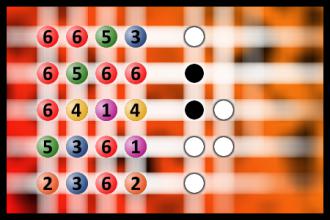Which is a winning combination of digits?
The computer chose a secret code (sequence of 4 digits from 1 to 6). Your goal is to find that code. Black circles indicate the number of hits on the right spot. White circles indicate the number of hits on the wrong spot.
Top ten jokes from the latest Edinburgh Fringe comedy festival
Top ten jokes from the latest Edinburgh Fringe comedy festival
1. Masai Graham:
I tried to steal spaghetti from the shop, but the female guard saw me and I couldn't get pasta.
2. Mark Simmons:
Did you know, if you get pregnant in the Amazon, it's next-day delivery.
3. Olaf Falafel:
My attempts to combine nitrous oxide and Oxo cubes made me a laughing stock.
4. Hannah Fairweather:
By my age, my parents had a house and a family, and to be fair to me, so do I - but it is the same house and it is the same family.
5. Will Mars:
I hate funerals - I'm not a mourning person.
6. Olaf Falafel:
I spent the whole morning building a time machine, so that's four hours of my life that I'm definitely getting back.
7. Richard Pulsford:
I sent a food parcel to my first wife. FedEx.
8. Tim Vine:
I used to live hand to mouth. Do you know what changed my life? Cutlery.
9. Sophie Duker:
Don't knock threesomes. Having a threesome is like hiring an intern to do all the jobs you hate.
10. Will Duggan:
I can't even be bothered to be apathetic these days.

